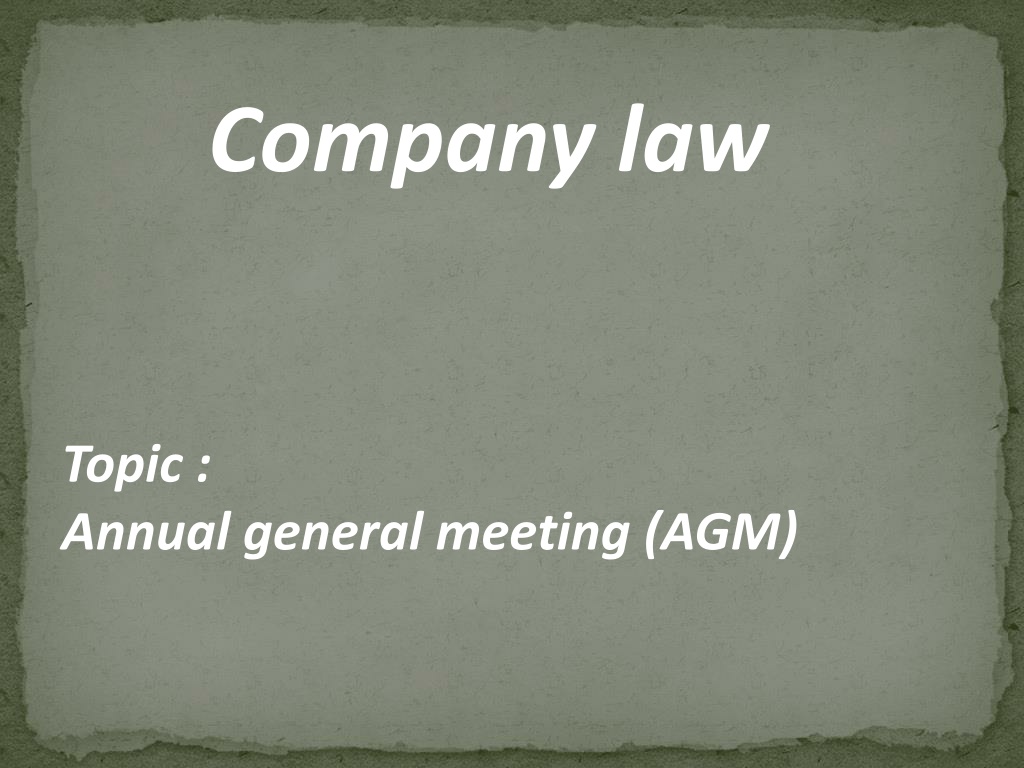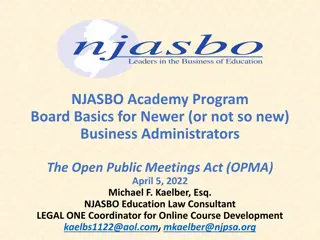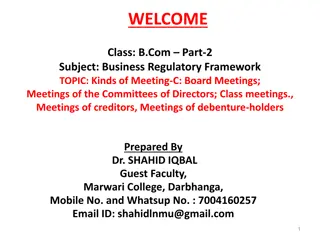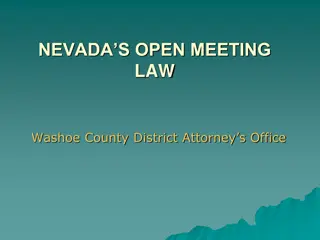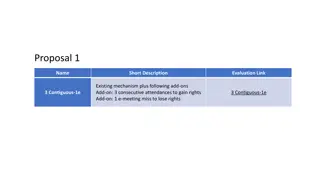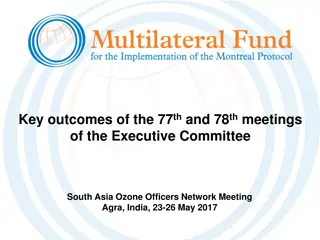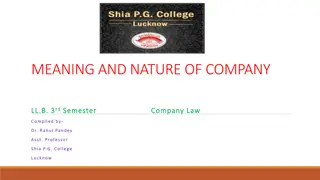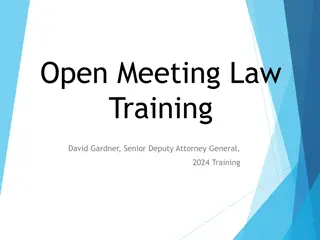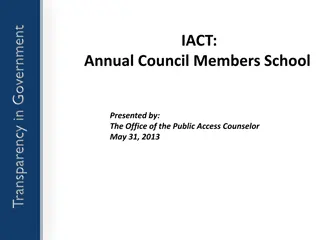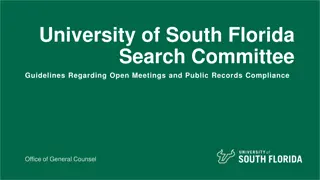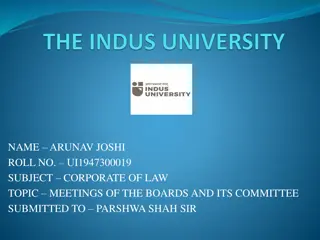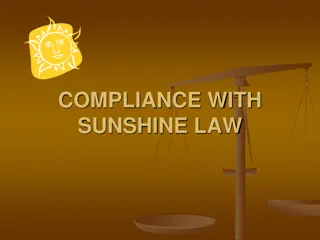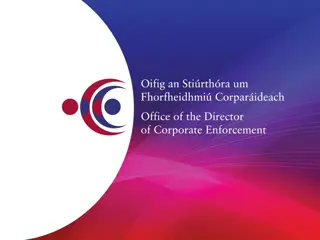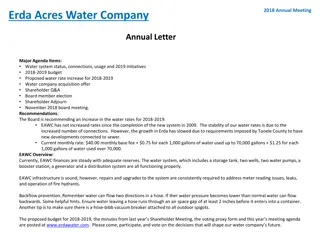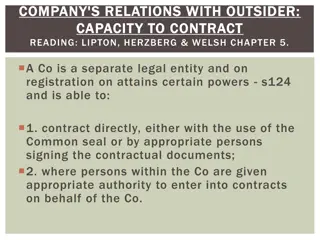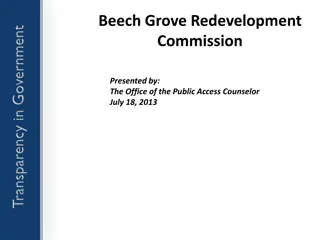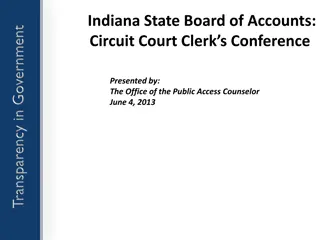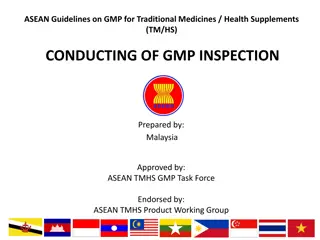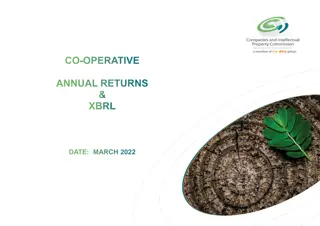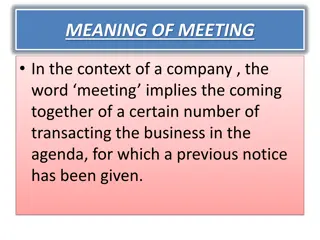Understanding Annual General Meetings in Company Law
An Annual General Meeting (AGM) is a significant yearly gathering of a company's shareholders where directors present financial reports and shareholders vote on key matters. This article discusses the importance, requirements, procedures, and penalties associated with AGMs in company law, comparing provisions under the Companies Act 1956 and Companies Act 2013.
Download Presentation

Please find below an Image/Link to download the presentation.
The content on the website is provided AS IS for your information and personal use only. It may not be sold, licensed, or shared on other websites without obtaining consent from the author. Download presentation by click this link. If you encounter any issues during the download, it is possible that the publisher has removed the file from their server.
E N D
Presentation Transcript
Company law Topic : Annual general meeting (AGM)
Index Meaning of AGM 4 Comparative chart 5 9 Mandatory requirement for holding AGM 10 Objects of AGM 11 Time period for holding AGM 12 14 Subsequent AGM(u/s 96) 15 Extension of time 16 Proper authority 17 notice 18 Notice to whom 19 Time , date and place for holding the AGM (u/s 92{2}) 20 Quorum 21 Business to be transacted {section 102} 22 Postponement 23 Procedure for holding adjourned AGM 24 25 Penalty {section 99} 26 Chairman s speech 27 Drafting the notice of the AGM 28
Meaning of Annual general meeting An annual general meeting (AGM) is a mandatory yearly gathering of a company s interested shareholders . At the AGM the directors of the company present an annual report , which contains information for shareholders about its performance and strategy . Shareholders with voting rights vote on current issues , such as appointments to the company s board of director , executive compensation , dividend payments and selection of auditors .
Comparative chart points of points of comparison comparison Companies act Companies act 2013 2013 Companies act , 1956 Dealing for holding the first AGM First AGM is required to be held within 9 months from the end of the first financial year. The first AGM of a company was required to be held with in a period of not more than 18 months from the date of its corporation .
COMPARATIVECHART Companies act , 1956 points of comparison Companies act 2013 Exemption from holding AGM in the year following year of incorporation if first AGM held within 18 months from date of incorporation . Exemption for holding AGM in the year following the year of incorporation if first AGM held within statutory dealing . No such exemption under the 2013 Act .
COMPARATIVECHART Companies act , 1956 points of comparison Companies act 2013 Section 166(2) of the 1956 Act required that every AGM should be called for a time during business hours , o a day that is not a public holiday . See rule 17 of the companies and rules , 2014 . Day , venue and time for AGMs Section 96(2) of the 2013 act provides that every annual general meeting shall be called during business hours , that is between 9 a.m. and 6 p.m. on any day that is not a national holiday .
Comparative chart points of points of comparison comparison Companies act Companies act 2013 2013 Companies act , 1956 Company secretary / secretarial audit Mandatory secretarial audit by a company secretary in practice for listed companies and every public company having a paid up share capital of rs. 50 crores or more or turnover of rs. 200 crore or more Secretarial audit for bigger companies No such requirements .
Comparative chart points of points of comparison comparison Companies act Companies act 2013 2013 Companies act , 1956 Functions of company secretary . New provisions introduced by the 2013 Act . No provisions on functions of company secretary in the 1956 Act .
Mandatory requirement for holding AGM Every company shall in each year hold in addition to any other meeting a general meeting as its annual general meeting {section 96} . The term year has not been defined in the companies Act . It means calendar year as defined in the general clauses Act , In another word ,calender year is to be calculated from 1st january to 31st december and not twelve months from the date of incorporation of the company .
Objects of Annual General Meeting An annual general meeting is an important meeting of protecting the interests of the shareholders . It is only at the annual general meeting of a company that the shareholder can exercise control over the affairs of the company . The board of director place accounts for consideration , approval and adoption by shareholders in the AGM . Shareholders exercise control over the management by re electing or refusing to elect the directors . The auditors of the company are also replaced or reappointed by the shareholders in the AGM . Dividends proposed by the directors is declared in the AGM .
Time period for holding AGM : Under companies act 2013 Under the previous act 1956 First AGM First AGM shall be held with in 18 months from the date of its incorporation-u/s 166 2013 Act has replaced the deadline of 18 months from the date of incorporation . The first AGM shall be held within 9 months from the end of the first financial year .
Time period for holding AGM : Under companies act 2013 Under the previous act 1956 Under the 2013 Act also , the subsequent AGM is required to be held on the earliest of the three dates {same dates as existed in 1956 Act . } Under section 166 and 210 of the companies Act , 1956 the AGM subsequent to the first AGM was required to be held on the earliest of the three given dates : i. The meeting must be held in each year i.e. , latest by 31st december each year . ii. The meeting must be held in 15 months from the date of the previous annual general meeting . Subsequent AGM
Under companies act 2013 u/s 96 (2) of 2013 Act , the business hours have been clearly defined i.e. between 9 a.m. and 6 p.m. UNDER THE PREVIOUS ACT 1956 Business hours u/s 166 (2) of the 1956 Act , every AGM should be called during business hours .
SUBSEQUENT AGM { U/S 96 } There must be one meeting held in each year , i.e. calendar year . In other words , one separate and distinct meeting every year . The gap between two AGM s must not be more than fifteen months . AGM must be held not later than 6 months from the close of the financial year . These three requirements are cumulative as well as separate ; which means that failure to company with any of them shall constitute an offence . i. ii. iii.
Extension of time The registrar may , for any special reason extend the time for holding the annual general meeting by a period not exceeding three months {section 96(1)} . It may be noted the court or NCLT is excluded from the power to extend the time of holding AGM . Hence the court or NCLT has no power to call and conduct the AGM . It means onlyROC has power to grant extension . For example : Name of company AGM of company Date of last Financial year Last date for holding AGM 30-9-2014 31-8-2014 31-12-2014 Reliance industries ltd . 1-4-2014 to 31-3-2014 Which is earlier i.e. 31-8- 2014 Registrar may grant the extension to hold AGM by 30-11-2014 31 5- 2014
PROPERAUTHORITY The board of directors is the proper authority to convene AGM and if the managing directors , manager , secretary or other officer calls a meeting without such authority . It will not be effectual unless the board retifies the act before the meeting is held .
Notice A public company must give at least 21 clear days notice for convening annual general meeting . The period of 21 days is calculated from the date of receipt of the notice by the members . It excludes : i. The day of service of the notice . ii. The day on which the meeting is to be held . Notice is deemed to have been received by the members at the expiration of 48 hours after the letter containing it is posted . The notice shall state the meeting to be an annual general meeting specially . Annual general meeting may be held with a shorter notice if it is so agreed by not less than 95% of the members entitled to vote in the meeting .
Time , date and place of holding the annual general meeting {section 96(2)} Time : Every annual general meeting shall be called during business hours . Business hours means between 9 am and 6 pm . It has been clarified by the department of company affairs that the starting point of the meeting should be within the business hours but the duration is left to the meeting its self according to the speed with which it is in a position to go through its agenda . Day : AGM shall be called on a day which is not a public holiday . public holiday is defined in section 2(38) of the act as a public holiday within the meaning of the negotiable instrument act , 1881. The term public holiday includes sundays and any other day declared by the central government to be a public holiday . 30th june and 31st december are not public holidays under section 96 , even if declared as public holidays for the limited purpose of half yearly closing of accounts of banks and treasuries etc .
QUORUM Quorum of annual general meeting is 5 members for a public company and of atleast 2 members for a private company personally present . Increase in quorum requirements for public companies having more than 1000 members - under the 1995 Act , the quorum requirement for public companies for general meeting was 5 members personally present unless the articles stipulated a large number . Section 103 of the 2013 act fixes quorum based on the number of members of the company as under : 5 members personally present if the number of member as on date of meeting is not more than 100 . 15 members personally present if the number of members as on date of meeting is more than 1000 but not more than 5000 . 30 members personally present if the number of members as on date of meeting is more than 5000 .
Business to be Transacted (section 102) The business to be transacted at on AGM may comprise of : Ordinary business : In the case of annual general meeting the following business is deemed as ordinary business . a) The declaration of dividend ; b) The appointment of directors in the place if those retiring ; and c) The appointment of , and the fixing of remuneration of , the auditors . Special business : For transacting special business at a meeting , there shall be annexed to the notice of the meeting an explanatory statement setting out : a) All material facts concerning each item of such business ; b) In particular , the nature of the concern pr interest , if any , of every director or every other key managerial personnel or relatives in each item . c) The statement must also state the time and place where the document , if any proposed for approval at the meeting can be inspected by members .
POSTPONEMENT When an annual general meeting is convened for a particular date and notice is issued to the members, the board of directors may cancel or postpone an annual general meeting provided such implied power is exercised for bona fide and proper reasons. Incomplete books of accounts- proper remedy is adjourment of meeting Where the accounts are not ready for being placed before the annual general meeting, non-holding of the meeting is an offence. The excuse that the accounts are not complete is not legally acceptable.
Procedure For Holding Adjourned Annual General Meeting An annual meeting may be adjourned by the chairman if the meeting bonafide so decides. However, the chairman cannot wrongfuly adjourn the meeting for some ulterior motive and if he does so the members may appoint a new chairman and accordingly proceed the meeting voting rights where the meeting held after the prescribed time limit
(i) Power of the tribunal to call annual general meeting [section97] If any company fails to hold an annual general meeting as prescribed u/s 96 of 2013 Act within the prescribed period, the tribunal on the application of any member, may (i) either call or (ii) Direct the calling of a general meeting of the company (iii)It may give such directors as it thinks fit in regard to the calling, holding, or conducting of such meetings. (iv) The tribunal may direct that one member of the company present in person or by proxy shall be deemed to constitute a meeting.
[SECTION 99] PENALTY If default is made in holding the meeting of the company in accordance with section 96 or un complying with any direction of the tribunal under section 97, th company and every other officer of the company who is in default , shall be punishable with fine [1] which may extend to $1,00,000 and [2] in case of continuing default with further fine.
Chairmans speech It is a matter of custom or tradition. Basically the chairman s speech is to give details or highlight aspects which are not covered in the director s report as the later document includes the statutory information. The chairman s speech for a particular company may differ from year to year depending on the circumstances, but matters which are generally included in the speech are: 1. Review of the company s working 2. Progress during the year, 3. Difficulties and constraints faced by the company during the year. 4. Measures intiated to overcome such difficulties, and 5. Immediate and future prospects of the company.
Drafting The Notice of The Annual General Meeting The following points must be observed while drafting the notice of the annual general meeting of a company: The meeting should be held either at the registered office or at a place within the city. Town or village in which the registered office is situated; i. The meeting should be convened during the usual business hours; ii. Notice should be under proper authority and, therefore, the words by order of the board should be added before the name of the secretary; iii. Under section 127, dividend warrants must be sent within 30 days from the date of declaration. A note is added to the notice indicating the date by which the dividend warrants will be posted. iv. If any special business is proposed to be transacted , the explanatory statement under section 102 of the Act must be attached to the notice. v.
In AGM the all members of meeting is mainly focused on the profit and loss of the company . After the all discussion the chairman also gives a motivational speech to the members of meeting . In AGM all members of meeting is discussing about company target , appraisal , promotion and marketing , profit and loss , and five years plan of company . The AGM guides an annual report , statement of account and financial report , encouraging members to attend , motions , nomination and elections of directors etc .
